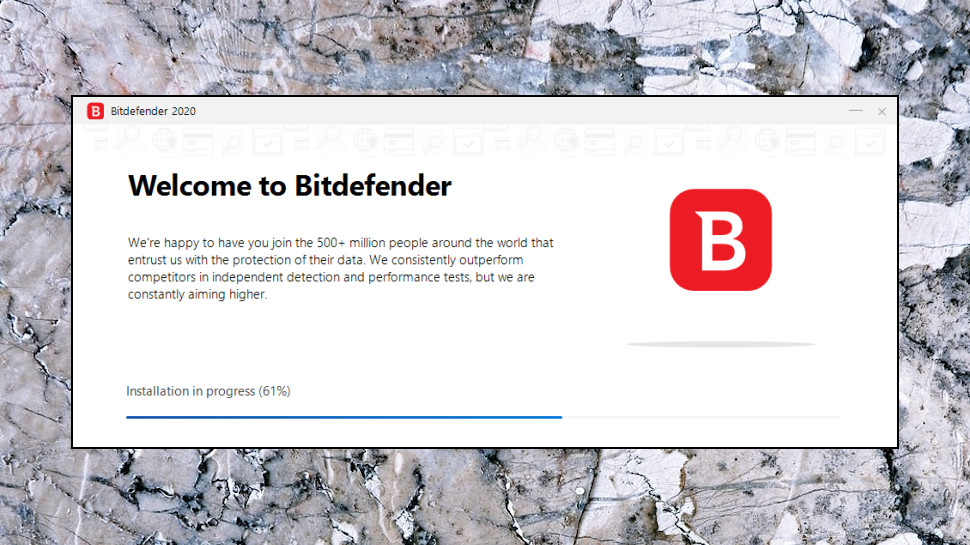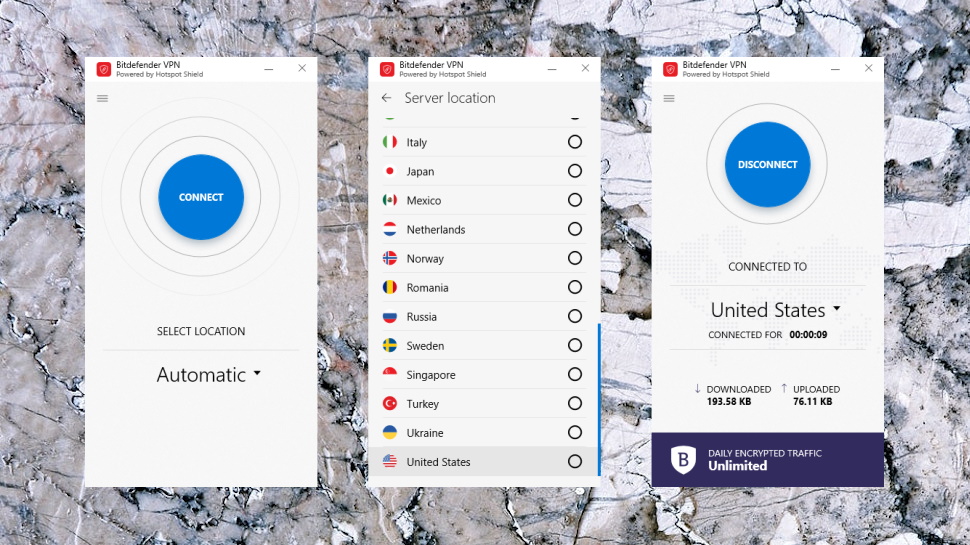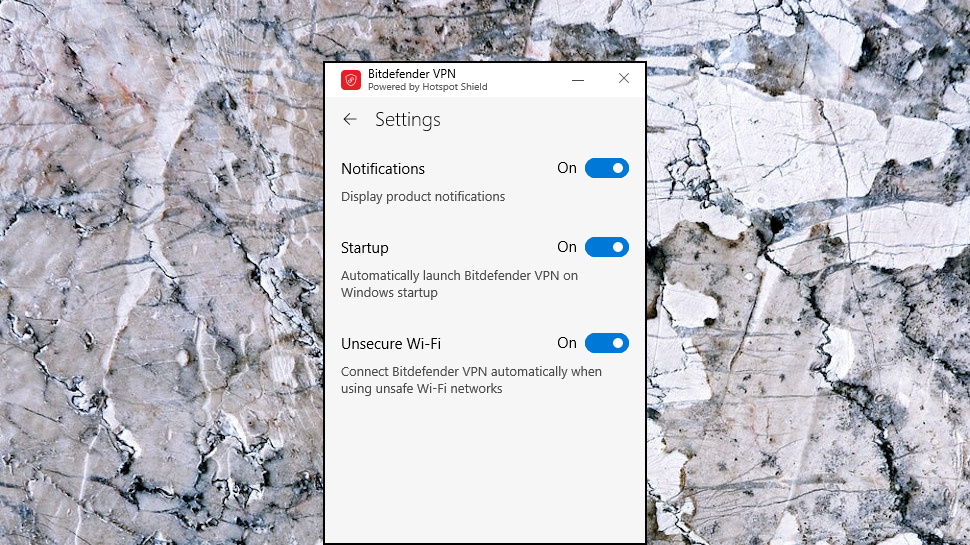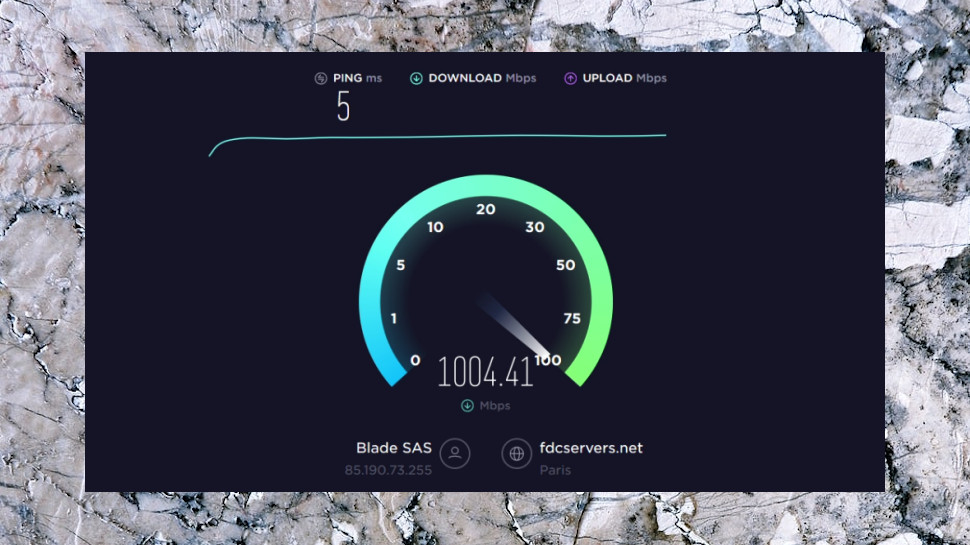Sign up for any of Bitdefender's excellent security packages - Antivirus Plus, Internet Security, Total Security or its mobile apps - and you'll now also get a bundled VPN. Sounds great, until you realize there's no option to choose a location (the app automatically picks the nearest server), and you spot the tiny data transfer limit of 200MB a day.
Buying an additional Bitdefender Premium VPN license gets you unlimited traffic and full access to all 27 countries. (Bitdefender VPN is powered by Hotspot Shield, a strong indicator that you're going to get a decent service.)
- Want to try Bitdefender Premium VPN? Check out the website here
Prices are low at $6.99 billed monthly, or an equivalent $3.33 a month for year one on the annual plan (so cheaper than the VPN heavyweights of ExpressVPN and NordVPN), $4.17 on renewal. You can pay by card, PayPal or bank transfer.
One potential issue to consider is that you'll only be able to use the VPN on the number of devices covered by your Bitdefender security software license.
If you've bought Bitdefender Antivirus Plus for a single device, for instance, then you'll only be able to use the VPN on that device, perhaps a problem.
But if you've purchased a Total Security License covering ten devices, then you'll be able to use the VPN on all of these for the same price, a much better deal.
There's no trial of the full service, unfortunately, and the 200MB-a-day free product won't give you much of an idea of how it really works (that's not even enough bandwidth to run a single web-based speed test.)
Bitdefender does provide a 30-day money-back guarantee, though, so you should be able to get a refund if the service doesn't work out for you.
Privacy and logging
Bitdefender Premium VPN appears to be a solely Bitdefender product - you pay them to use the service, it's powered by their software - but it works by connecting to Hotspot Shield servers and using the Hotspot Shield network. That doesn't matter at all when you're using the service, but it's relevant when you're trying to figure out the service logging policy, because that isn't under Bitdefender's control.
You can see this in Bitdefender's very basic Privacy Policy, describing the data it uses:
"We collect for this service only randomly generated or hashed user and device IDs, IP addresses and randomly generated tokens to establish VPN connection for the sole purpose of providing the VPN service. For this service, we use AnchorFree as data processor who processes data on behalf of Bitdefender in accordance with Bitdefender's instructions and for the sole purpose of providing VPN services to users."
Not exactly helpful.
What we can say is that Bitdefender knows the devices where you've installed the VPN, as this will have its security software (you can't run the VPN stand-alone.) To manage a 200MB per day limit on the free plan, Bitdefender must be able to maintain at least a running total of the bandwidth used per device. But it can't see the websites you're visiting, or the content of your web traffic, as that's encrypted by the VPN.
Any more detailed service logging is carried out by Hotspot Shield. Its privacy policy explains, reassuringly, that there's no monitoring of your web traffic or browsing history. But there's more session logging than you might expect, too, including the recording of device identifiers, browser types, device settings, network information and more. This doesn't allow the company to see anything of what you're doing online, but it's still more than you'll see with most of the competition. Check out our full Hotspot Shield review if you're concerned.

Apps
To try Bitdefender VPN, you must first install one of Bitdefender's security applications. If you don't have one yet, you can usually install a free trial, so for example there's a 30-day trial version of Bitdefender Total Security available for Windows. But keep in mind that the suite only includes the limited 200MB per day version of the VPN, and you won't get a real idea of the VPN's abilities until you've handed over some cash.

Bitdefender's client is very, very basic, with the bare minimum of features. A large blue Connect button by default connects you to your nearest server; you're able to choose another location from a simple list; and there are settings to launch Bitdefender VPN along with Windows, and automatically connect whenever you access an insecure wireless network.
We noticed a few small enhancements since the last review. A desktop notification now tells you when you're protected, for instance, and you don't have to manually close the existing connection before you can choose a new server.

There are still very few of the other features we would normally hope to see, though. You can't choose locations at the city level, only countries; there's no Favorites or Recently Used list to speed up accessing commonly-used servers; no kill switch to block internet access if the connection drops; and no option to change protocol, or tweak your connection in any way.
There are some plus points. The client is so easy to use that even total beginners probably won't need any support, and it handles unexpected situations with ease. When we made the VPN connection drop by forcibly closing the openvpn.exe process - a very aggressive step which is most unlikely to happen in real life - the client warned us immediately with a desktop alert, then automatically reconnected within seconds. (The lack of a kill switch meant our traffic was exposed until the connection was re-established, though.)
If you're looking to buy Bitdefender Premium VPN as a cheaper route to access Hotspot Shield, it's worth noting that Hotspot Shield's own Windows client has a few extra features, including a kill switch, extra leak protection, finer control over when the VPN will automatically connect, and the very speedy Catapult Hydra protocol (the Windows client is OpenVPN-only.)
Bitdefender Premium VPN is also considerably cheaper, so might be worth the tradeoff. But if you'd like to compare the two, Hotspot Shield's free trial gives you 7 days to check out the service.

Performance
Bitdefender sells Premium VPN mostly for its encryption and anonymity benefits, but the website claims it can also 'unlock media, videos & messaging from all over the world.'
That wasn't true for BBC iPlayer, unfortunately. When we tried to stream content while connected to the UK server, iPlayer told us 'this content is not available in your location.'
Premium allowed us to stream US Netflix content, an improvement on our last review. But that was the testing highlight, as the service failed with Amazon Prime Video and Disney+.
Premium had some speed issues during our last review, but not this time, Connecting to Bitdefender Premium VPN's nearest UK server gave us decent speeds of around 66-68Mbps on a 75Mbps test connection, much the same as we'd expect from any quality VPN.
This wasn't some fluke, either. Speeds were reliable everywhere, with European cities very similar to UK performance, UK to US speeds a capable 40-45Mbps, even the long-distance destinations Australia and Singapore were consistently above 30Mbps.
The good news continued right up to the end of the review, too, as multiple test sites found our test client didn't have any DNS or WebRTC leaks.
Final verdict
Bitdefender Premium VPN works well as a simple way for Bitdefender users to secure their network connections when they're out and about, but the service doesn't have the power, the features or the configurability of services like ExpressVPN to attract more demanding types.
- Also check out our roundup of the best VPN services
from TechRadar: Technology reviews https://ift.tt/3eMju6t
No comments:
Post a Comment